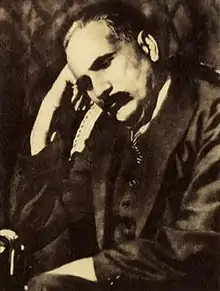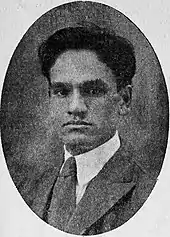National poet
A national poet or national bard is a poet held by tradition and popular acclaim to represent the identity, beliefs and principles of a particular national culture.[1] The national poet as culture hero is a long-standing symbol, to be distinguished from successive holders of a bureaucratically-appointed poet-laureate office. The idea and honoring of national poets emerged primarily during Romanticism, as a figure that helped consolidation of the nation states, as it provided validation of their ethno-linguistic groups.[1]

Most national poets are historic figures, though a few contemporary writers working in relatively new or revived national literatures are also considered "national poets". Though not formally elected, national poets play a role in shaping a country's understanding of itself.[2] Some nations may have more than one national poet; the idea of a single one is always a simplification. It has been argued that a national poet "must write poetry that closely identifies with the nation's cause – or is thought to do so",[3] with an additional assumption being that "a national poet must write in a national language".[4]
The following is a list of nations, with their associated national poets. It is not a list of sovereign states or countries, though many of the nations listed may also be such. The terms "nation" (as cultural concept), "country" (as geographical concept) and "state" (as political concept) are not synonyms.
Africa
Asia
Europe
North America
Oceania
| Country | Poets |
|---|---|
| Henry Lawson, Adam Lindsay Gordon, Dorothea Mackellar, A. B. "Banjo" Paterson | |
| James K. Baxter, Allen Curnow |
South America
References
- Nemoianu, Virgil (2002). Esterhammer, Angela (ed.). "'National Poets' in the Romantic Age: Emergence and Importance." Romantic Poetry. John Benjamins Publishing. p. 537. ISBN 9789027234506.
- "Our National Poets", Ricardo Blanco, Academy of American Poets, 2020. https://poets.org/our-national-poets
- John Neubauer, "Figures of National Poets", in Marcel Cornis-Pope and John Neubauer, eds., Figures of National Poets (2004), p. 11.
- Michael Baron, Language and Relationship in Wordsworth's Writing (1995), p. 13.
- J. Cameron; W. A. Dodd (17 May 2014). Society, Schools and Progress in Tanzania: The Commonwealth and International Library: Education and Educational Research. Elsevier Science. pp. 57–. ISBN 978-1-4831-5914-0.
- Morgenstierne, G. (1960). "Khushhal Khan—the national poet of the Afghans". Journal of the Royal Central Asian Society. 47: 49–57. doi:10.1080/03068376008731684.
- "They Found Their Voice: Stories from Soviet Nationalities with No Written Language Before the 1917 October Revolution". Progress Publishers. 4 February 1977 – via Google Books.
- 기획 기사 [9.9절 방북취재-6]<백두산은 역시 혁명의 성산> (in Korean). Korean American National Coordinating Council. 23 September 2008. Retrieved 10 November 2020.
- "Ausiàs March".
- Hristo Botev’s birth anniversary Archived 2007-09-27 at the Wayback Machine, Radio Bulgaria History and Religion, posted January 6, 2007, updated on January 12, 2007, accessed 9 March 2007
- Michael Dobson (17 November 1994), The Making of the National Poet - Shakespeare, Adaptation and Authorship, 1660-1769, Clarendon Press, ISBN 978-0-19-818323-5
- "Kansallisrunoilija pelkäsi kansaa", Yleisradio (in Finnish), Helsinki: Yleisradio, 2017, retrieved 7 February 2021
- "kansallisrunoilija", Kielitoimiston sanakirja (in Finnish), Helsinki: Kotimaisten kielten keskus, 2020, retrieved 7 February 2021
- Balazsr2=Michal Kopecek (1 November 2006). National Romanticism: The Formation of National Movements. Central European University Press. p. 431. ISBN 978-963-7326-60-8.
Characteristically, although Njegoš saw himself as a definitely Serbian poet, his epic came to be later canonized as the most important work of 'Yugoslav' literature [...]
- "José Lezama Lima | Cuban author". Encyclopedia Britannica.
- Foundation, Poetry (25 December 2020). "Nicolás Guillén". Poetry Foundation.
- Daniel Balderston, Mike (2004). Encyclopedia of Latin American and Caribbean Literature, 1900-2003. Routledge. p. 666. ISBN 0-415-30687-6.
- Cole, Teju (21 February 2014). "Poet of the Caribbean (Published 2014)". The New York Times – via NYTimes.com.
- "Overlooked No More: Julia de Burgos, a Poet Who Helped Shape Puerto Rico's Identity (Published 2018)". The New York Times. 3 May 2018 – via NYTimes.com.
- Poets, Philosophers, Lovers: On the Writings of Giannina Braschi. Pittsburgh, 2020. ISBN 9780822946182
- García, Marta Yazmín (7 November 2008). "Alabanza al poeta nacional" [Praise to the national poet]. University of Puerto Rico at Mayagüez (in Spanish). Archived from the original on 10 September 2015. Retrieved 8 October 2021.
- Rojas, Enrique (2 February 2015). "Cuba y Puerto Rico tienen la presión" [Cuba and Puerto Rico Have the Pressure]. ESPN Deportes.com (in Spanish). Archived from the original on 9 October 2021. Retrieved 8 October 2021.
- Tió, Elsa (12 August 2020). "Nimia Vicéns: Corazón de la patria con semillas silvestres en sus versos" [Nimia Vicéns: Heart of the country with wild seeds in her verses]. El Adoquín Times (in Spanish). Archived from the original on 4 February 2021. Retrieved 8 October 2021.
- Nathanael O'Reilly, "Imagined America: Walt Whitman's Nationalism in the First Edition of 'Leaves of Grass'", Irish Journal of American Studies.
- O'Reilly, Nathanael (2009). "Imagined America: Walt Whitman's Nationalism in the First Edition of Leaves of Grass". Irish Journal of American Studies. 1: 1–9. Retrieved 11 October 2020.
- Foundation, Poetry (25 December 2020). "Gwendolyn Brooks". Poetry Foundation.
- James Woodall, Borges: A Life, Basic Books (1996). ISBN 0-465-04361-5. Relevant excerpt available on the New York Times web site, accessed 9 March 2007.
- "Gabriela Mistral". National Women's History Museum.
Further reading
- Marcel Cornis-Pope and John Neubauer, eds., Figures of National Poets (2004)
- Edward Whitley, American Bards: Walt Whitman and Other Unlikely Candidates for National Poet (2010)
- Michael Dobson, The Making of the National Poet (1992)
- Josep R. Llobera, Foundations of National Identity (2004)


.jpg.webp)

.jpg.webp)

.jpg.webp)











.png.webp)


